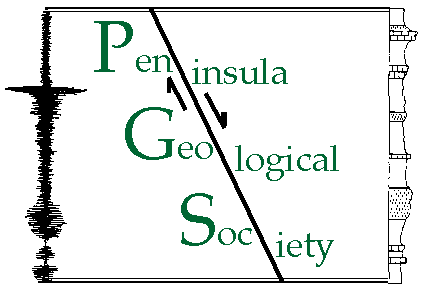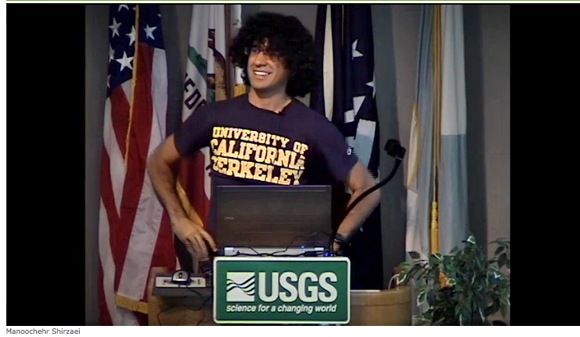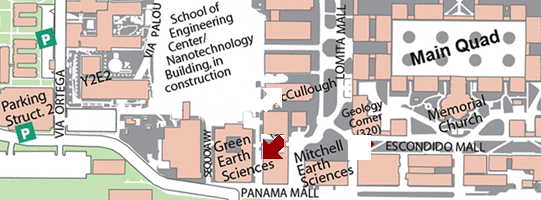
Presents
Location: Stanford University
This will be the 430th meeting since 1954

Time slices from the time-variable slip inversion of InSAR and alinement array data. Blue dots are the locations of background seismicity. Slip shown is cumulative
Interferometric synthetic aperture radar (InSAR) provides valuable spatiotemporal observations of surface deformation in volcanic and tectonic areas. In this study we generate a long time series of InSAR-measured deformation over the San Francisco Bay Area by combining over 100 ERS1/2 and Envisat SAR acquisitions from 1992 through 2011. We apply an advanced multitemporal processing algorithm that uses multiple-master interferometry and generate about 700 interferograms. The systematic errors (such as DEM error and atmospheric delay) are estimated and reduced by using a variety of wavelet-based filters. The differential displacement measured in each unwrapped interferogram is inverted to generate time series of the surface displacement for identified stable pixels.
To solve for the time dependent model of aseismic slip on the Hayward fault, the upper-crustal fault plane is discretized into triangular patches. Then, we apply an iterated inversion approach, combining static slip inversion and Kalman filtering to model temporal behavior of the slip. Combination of the advanced InSAR analysis, time dependent modeling and data handling allows us to investigate spatiotemporal variation of the creep at Hayward fault that might explain the 2011 seismic swarm at Berkeley.

Manoochehr Shirzaei
Manoochehr Shirzaei earned his B.A. in Surveying engineering in 2001 from Amir-Kabir University of Technology, Tehran, Iran. He received his M.S. in Geodesy in 2003 from Tehran University, and was graduated Summa cum laude with his Ph.D. from Potsdam University, Potsdam, Germany. The title of his thesis is "Crustal deformation source monitoring using advanced InSAR time series and time dependent inverse modeling" He has worked as a Geophysicist/geodesist in Iran and Germany, was a Postdoctoral Scholarj at the German Research Centre for Geosciences (GFZ) in Potsdam (where earned the Award for top junior scientist), and since March 2011 has been a Postdoctoral Scholar, Univ. of California, Berkeley. His past research has been on International plate boundary observatory Chile, Exupery: Managing volcanic unrest, GPS network design for geophysical applications, and Blind fault positioning using aeromagnetic data. His current research project is on time-dependent creep modeling on the Hayward Fault. He has been invited to give talks in Austria, Germany, France, Iran, and at USGS in Menlo Park. In August 2011 he presented at the USGS Earthquake Science Center Seminar on "Spatiotemporal crustal deformation field monitoring and modeling using advanced InSAR time series and time-dependent modeling" and on January 30, 2012, he presented at the USGS - National Earthquake Hazards Reduction Program on "Transient Slip on the Hayward Fault from InSAR, GPS and Seismicity Data."
Reservations: The preferred way to make reservations is simply to email Mike Diggles at mdiggles@usgs.gov by Feb. 5, tell him you will attend, commit to pay, and bring your payment to the meeting. Mike always emails a confirmation; if you don’t get one, assume email crashed yet again and email him a second time. A check made to “PGS” is preferred, payable at the meeting.
If you want to pay in advance:
Everyone (including Stanford folks now) Please make dinner reservations by Feb. 5. Contact Mike Diggles, at U.S. Geological Survey, 345 Middlefield Road, MS-951 Menlo Park, CA 94025, Tel.: (650) 329-5404. Send check made out to “PGS” to Mike.
Dinner and the social hour is $35.00; this includes $5 that we use to help pay for students who are only $8.00 (also partially subsidized thanks to the School of Earth Sciences, Stanford University (Note, no-show reservations owe the full price).
Doris, whose wonderful crew prepares our meals, asked that we let you know that people who are late RSVPing and people who show up without a reservation will be welcome but that they will be eating on paper plates with plastic utensils (food supply permitting).
Dues for Academic Year 2011-2012 ($10.00) should be sent to Mike Diggles, U.S. Geological Survey, 345 Middlefield Road, MS-951, Menlo Park, CA 94025. Mike’s phone: (650) 329-5404.
Officers: Mireya Berrios, President; Joe Colgan, Vice President; Mike Diggles, Secretary-Treasurer; Elizabeth Miller, PGS Stanford University Coordinator

Date created: January 24, 2012
Last modified: January 30, 2012
Created by: Mike Diggles, Webmaster-Secretary-Treasurer, PGS.